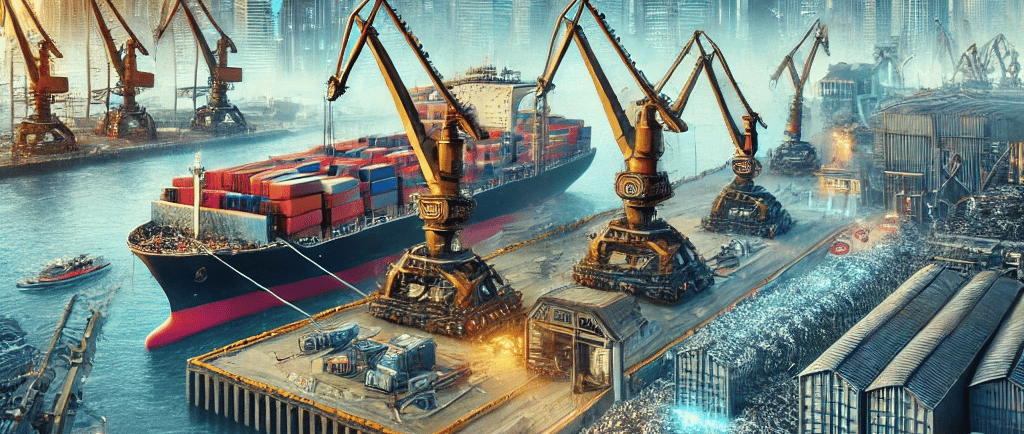China and India’s Growing Influence on the Asia-Pacific Scrap Metal Market
Discover how China and India are transforming the Asia-Pacific scrap metal market through policy shifts, infrastructure growth, and recycling innovations that make a significant impact.
SUSTAINABLE METALS & RECYCLING INNOVATIONS


The Asia-Pacific Scrap Metal Trade: A Market on the Move
In 2024, the Asia-Pacific scrap metal market is expected to surpass $170 billion, growing at a steady 5.2% annually. But behind this number lies a more dynamic story—one of shifting trade flows, policy upheavals, and a race to build a more sustainable supply chain.
China is tightening regulations while doubling down on high-tech recycling. India is ramping up domestic processing to cut reliance on imports. Southeast Asia is emerging as a major processing hub, absorbing redirected scrap from China.
For scrap traders, recyclers, and investors, the landscape is shifting fast. Understanding where the market is headed—and how to position for success—is now more important than ever.
China’s Market Influence: Stricter Rules, Bigger Opportunities
For years, China was the world’s go-to market for scrap metal, but in recent years, a series of strict environmental policies have changed the game. The National Sword policy continues to limit the import of low-quality scrap, forcing traders to supply only high-purity, processed materials.
At the same time, China is investing heavily in recycling automation:
AI-driven sorting systems are improving the efficiency and quality of recycled metals.
Automated smelting plants are processing materials faster with lower emissions.
The EV boom is driving demand for recycled aluminum, copper, and lithium for battery production.
For businesses, this means that China is still open for business—but only for those who meet its high standards. Companies exporting clean, sorted, and high-value non-ferrous metals like copper and aluminum will continue to find strong demand.
India’s Rising Role: A Market Ready to Take Off
India’s urban population is growing at 2.3% per year, fueling an unprecedented demand for steel and aluminum. Unlike China, India is not limiting imports—it is actively building its own recycling industry.
The Vehicle Scrappage Policy (2021) and the Steel Scrap Recycling Policy are designed to boost domestic supply.
India’s expanding EV sector is creating demand for recycled copper, cobalt, and aluminum.
The government is pushing to reduce scrap imports in favor of processing more material domestically.
For traders, this shift presents an opportunity. Partnering with India-based scrap yards and investing in domestic recycling networks could pay off as the country scales up its infrastructure.
Southeast Asia: The New Global Scrap Processing Hub
As China turned away lower-grade scrap, Southeast Asia stepped in. Malaysia, Vietnam, and Indonesia have rapidly grown their metal processing industries, creating new trade routes for global suppliers.
Vietnam’s scrap steel imports have surged by 60% since 2019, making it a major buyer.
Malaysia has positioned itself as a key aluminum recycling hub, attracting foreign investment.
Indonesia is investing in its metal recycling infrastructure, aiming to become a bigger player in the regional market.
For traders, these countries offer alternative destinations for exports. However, each country has its own import regulations, making it essential to stay informed about policy updates to avoid trade disruptions.
The Road Ahead: What’s Driving Growth?
The Asia-Pacific scrap market is expanding fast, but three key trends will define its future:
Sustainability and Green Steel Production – Major economies are pushing for lower-emission metal production, increasing the need for recycled materials.
AI-Powered Recycling and Urban Mining – The use of technology to extract metals from old electronics and industrial waste will be a game-changer.
Regulatory Changes in China and India – Shifting policies will continue to shape pricing, supply chains, and market access.
Winning Strategies for Scrap Metal Traders
To stay competitive in this fast-changing market, businesses need to adapt and evolve. Here’s how:
1. Target China’s Demand for High-Quality Scrap
Export high-purity aluminum and copper to align with China’s strict import rules.
Partner with Chinese recyclers investing in automated processing technology.
2. Invest in India’s Expanding Scrap Ecosystem
Build relationships with local scrap yards as India moves toward domestic processing.
Monitor new government incentives that support metal recycling.
3. Leverage Southeast Asia’s Processing Hubs
Consider Vietnam and Malaysia as alternative export destinations.
Stay updated on import policy changes to ensure compliance.
4. Capitalize on EV-Driven Metal Recycling
Supply copper, aluminum, and lithium-ion battery scrap to manufacturers in the EV and battery sectors.
Track advancements in battery recycling technologies for emerging opportunities.
5. Stay Ahead of Policy Shifts
China may ease scrap import restrictions by 2025—businesses should prepare accordingly.
India’s potential carbon tax policies could incentivize greater use of recycled materials.
Looking Ahead: Seizing Opportunities in a Shifting Market
The Asia-Pacific scrap metal market is at a turning point. As urbanization, sustainability efforts, and EV expansion reshape global trade flows, businesses that stay ahead of these trends will have the competitive edge.
Key Takeaways for Industry Players:
India is scaling up its domestic metal recycling industry—establish a presence now.
Southeast Asia is becoming a global scrap processing hub—look beyond China for new opportunities.
China remains a high-value market for clean, high-quality scrap—meeting its standards is crucial.
Investing in AI-powered recycling technologies will future-proof operations.
Partner with TDC Ventures LLC
TDC Ventures LLC is committed to helping businesses navigate the complexities of the global scrap metal trade. We provide data-driven insights, market intelligence, and strategic guidance to optimize operations in this evolving landscape.
For expert consultation and tailored trade strategies, contact us today to explore opportunities in the Asia-Pacific scrap metal market.
